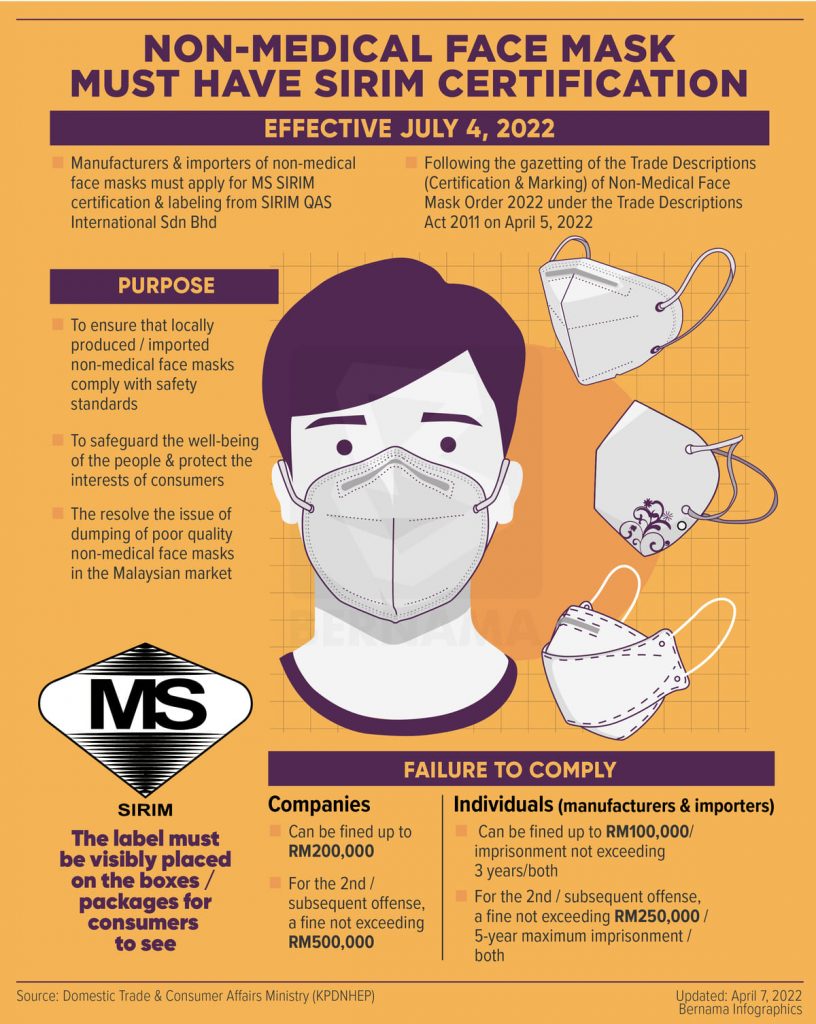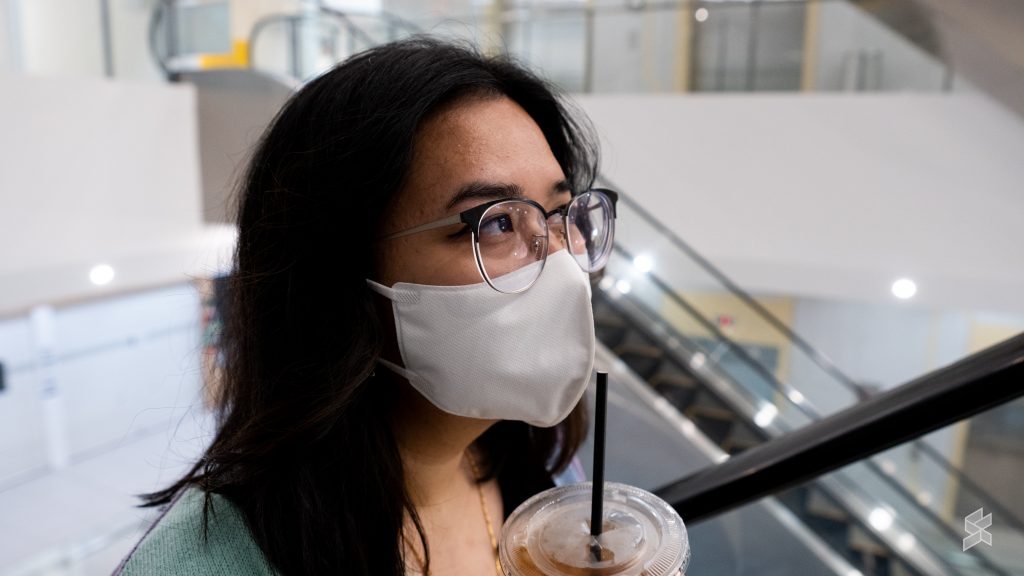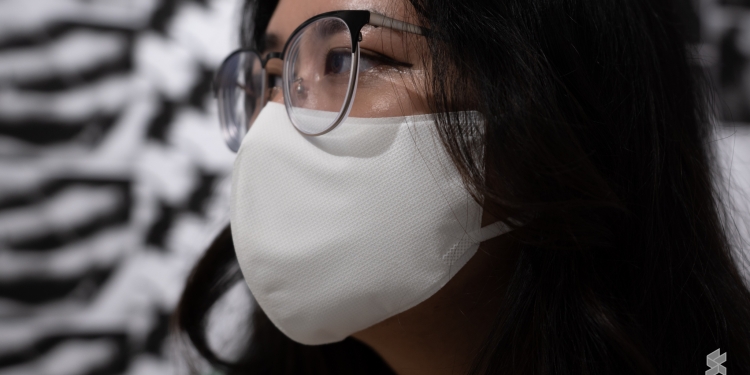On Tuesday the 5th of April 2022, the Domestic Trade and Consumer Affairs Ministry (KPDNHEP) ruled that importers and manufacturers of non-medical face masks in Malaysia must apply for MS SIRIM certification and labelling from SIRIM QAS International beginning 4th of July 2022. However, just two days later, the Ministry decided to postpone the commencement date to 1st January 2023 after receiving feedback from the public.
Prior to the announcement, the general public and experts raised concerns about price hikes and fate of the current inventory of face masks. KPDNHEP minister Alexander Nanta Linggi said the move to postpone will allow the industry and consumers to make the required adjustments to accommodate the new rule beginning next year. On the subject of the industry, he also advised traders, manufacturers, and importers not to seize this opportunity to raise the prices of non-medical masks before the new standards are enforced.
According to KPDNHEP, the decision to mandate SIRIM certification for non-medical face masks was a result of the gazetting of the Trade Descriptions (Certification and Marking) of Non-Medical Face Mask Order 2022 under the Trade Descriptions Act 2011.
PELITUP MUKA BUKAN PERUBATAN PERLU PENANDAAN MS SIRIM#KPDNHEP #SIRIM pic.twitter.com/gSqgGMXlrT
— KPDN (@KPDN_HQ) April 7, 2022
What’s the benefit of SIRIM certified face masks?
The significance of the ruling is to ensure that non-medical face masks conform to the set safety standards. Moreover, the compliance by manufacturers and importers to the new rule will curb the circulation of poor-quality face masks in our local market.
Internal medicine specialist and head of Medicine Department, Faculty of Medicine and Health Sciences, Universiti Malaysia Sabah, Dr Alvin Oliver Payus told Bernama he believes this is the right move by the Ministry. “All that is needed is a body to monitor the quality of face masks that are on the market…I agree with this enforcement, it is to ensure that people wear face masks that have the best protection,” he said.
This is out of concern for some face masks bought from a shady online seller that might not be effective in keeping you and me safe.
He commented, “Some non-medical face masks have certain standards, for example KN95, it meets Chinese standards while N95 meets US standards, including Malaysia, but those sold online directly from China, it is difficult for us to ensure the quality.”
What is the penalty for flouting this rule?
KPDNHEP explained that companies who refuse to comply will be facing fines up to RM200,000. As for individuals – manufacturers or importers of non-medical face masks – will be fined up to RM100,000 or prison sentences not exceeding three years or both. Repeating offenders, the fine not exceeding RM250,000 or imprisonment no more than five years or both.

The use of the word “individual” left some members of the public a bit confused as they assumed it would also include consumers. Many took to social media to vent their frustrations at the possibility of paying between RM100,000 to RM200,000 for unknowingly wearing a non-SIRIM certified face mask.
But this wasn’t the case as KPDNHEP clarified that “individual” in this context referred to people who are in the business of manufacturing and importing non-medical face masks. The end consumer need not be concerned about the penalty.
Potential price increase for face masks?
This is all good news so far as we as consumers can be confident that the masks we wear on our faces are doing their job at protecting us from unwanted micro introducers. However, this also means that manufacturers and importers are required to pay SIRIM to obtain the certification. Therefore, we might see a price hike if the cost of certification is passed on to the end consumer.
Bernama spoke with Universiti Putra Malaysia medical epidemiologist and biostatistician Assoc Prof Dr Malina Osman regarding this matter. She is worried that any price increase would affect consumers since face masks have become part of our daily lives. The Ministry of Health Malaysia has announced that masks are still mandatory during the endemic phase so face masks will continue to be a part of daily lives for the foreseeable.
Besides the consumer, she is also worried about traders who cannot clear the present stock of face masks. “If they cannot clear the stock, I hope there will be a mechanism that will be introduced so that face masks without MS SIRIM will not be disposed of just like that.” She suggested identifying face masks that are of quality and “saving” them, but it would first need to get approval from the parties in charge.
It is worth noting that she made the comment before the Ministry announced its decision to postpone the implementation date to 1st January 2023. Therefore, traders have more time to tackle the present inventory situation of non-medical face masks.
Are medical face masks certified as well?
Medical face masks are certified by a governing body to ensure it meets the required safety standard. In Malaysia, manufacturers of medical face masks must possess an ISO 13485 certification and be registered under the Medical Device Authority (MDA).
The face masks manufactured by the company will then need to get tested and certified by an authorised body such as SIRIM or SGS Malaysia. To anyone who is unaware, SIRIM has been providing face mask testing and certification via its wholly-owned subsidiary, SIRIM QAS International since October 2020.
The testing and certification for medical face masks are done in accordance with the international BS EN 14683 standard, which is a British accredited standard.
On the other hand, non-medical face masks are made from cloth, like a reusable fabric face mask. Moreover, if you do find a disposable three-ply surgical face mask that is not regulated by an international standard such as EN or ASTM, or certified by an authorised body like MDA, then it cannot be considered a medical face mask.

That said, SIRIM is also able to certify non-medical face masks by testing for Bacterial Filtration Efficiency (BFE), Differential Pressure, Splash Resistance Pressure (Synthetic Blood) and Microbial Cleanliness (Bioburden).








